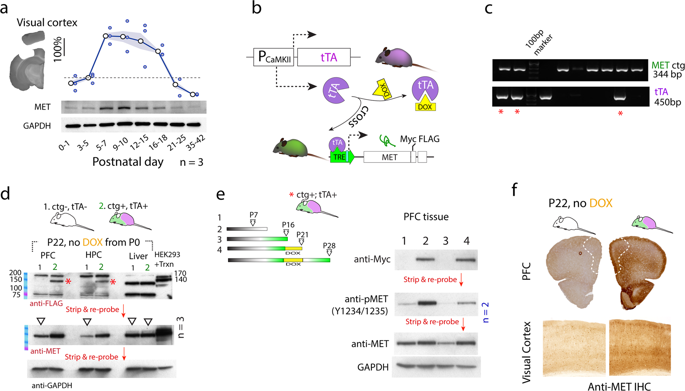当前位置:
X-MOL 学术
›
Mol. Psychiatry
›
论文详情
Our official English website, www.x-mol.net, welcomes your
feedback! (Note: you will need to create a separate account there.)
Time-delimited signaling of MET receptor tyrosine kinase regulates cortical circuit development and critical period plasticity.
Molecular Psychiatry ( IF 9.6 ) Pub Date : 2020-01-03 , DOI: 10.1038/s41380-019-0635-6 Ke Chen 1, 2 , Xiaokuang Ma 1, 3 , Antoine Nehme 1 , Jing Wei 1 , Yan Cui 2 , Yuehua Cui 1 , Dezhong Yao 2 , Jie Wu 1, 3, 4 , Trent Anderson 1 , Deveroux Ferguson 1 , Pat Levitt 5 , Shenfeng Qiu 1
Molecular Psychiatry ( IF 9.6 ) Pub Date : 2020-01-03 , DOI: 10.1038/s41380-019-0635-6 Ke Chen 1, 2 , Xiaokuang Ma 1, 3 , Antoine Nehme 1 , Jing Wei 1 , Yan Cui 2 , Yuehua Cui 1 , Dezhong Yao 2 , Jie Wu 1, 3, 4 , Trent Anderson 1 , Deveroux Ferguson 1 , Pat Levitt 5 , Shenfeng Qiu 1
Affiliation

|
Normal development of cortical circuits, including experience-dependent cortical maturation and plasticity, requires precise temporal regulation of gene expression and molecular signaling. Such regulation, and the concomitant impact on plasticity and critical periods, is hypothesized to be disrupted in neurodevelopmental disorders. A protein that may serve such a function is the MET receptor tyrosine kinase, which is tightly regulated developmentally in rodents and primates, and exhibits reduced cortical expression in autism spectrum disorder and Rett Syndrome. We found that the peak of MET expression in developing mouse cortex coincides with the heightened period of synaptogenesis, but is precipitously downregulated prior to extensive synapse pruning and certain peak periods of cortical plasticity. These results reflect a potential on-off regulatory synaptic mechanism for specific glutamatergic cortical circuits in which MET is enriched. In order to address the functional significance of the 'off' component of the proposed mechanism, we created a controllable transgenic mouse line that sustains cortical MET signaling. Continued MET expression in cortical excitatory neurons disrupted synaptic protein profiles, altered neuronal morphology, and impaired visual cortex circuit maturation and connectivity. Remarkably, sustained MET signaling eliminates monocular deprivation-induced ocular dominance plasticity during the normal cortical critical period; while ablating MET signaling leads to early closure of critical period plasticity. The results demonstrate a novel mechanism in which temporal regulation of a pleiotropic signaling protein underlies cortical circuit maturation and timing of cortical critical period, features that may be disrupted in neurodevelopmental disorders.
中文翻译:

MET 受体酪氨酸激酶的时限信号传导调节皮质回路发育和关键期可塑性。
皮质回路的正常发育,包括依赖于经验的皮质成熟和可塑性,需要基因表达和分子信号传导的精确时间调节。据推测,这种调节以及随之而来的对可塑性和关键期的影响在神经发育障碍中会受到破坏。MET 受体酪氨酸激酶是一种可能发挥这种功能的蛋白质,它在啮齿类动物和灵长类动物中受到严格的发育调节,并且在自闭症谱系障碍和雷特综合症中表现出皮质表达减少。我们发现发育中的小鼠皮质中 MET 表达的峰值与突触发生的高峰期一致,但在广泛的突触修剪和皮质可塑性的某些高峰期之前急剧下调。这些结果反映了 MET 富集的特定谷氨酸能皮质回路的潜在开关调节突触机制。为了解决所提出机制的“关闭”组件的功能意义,我们创建了一个可维持皮质 MET 信号传导的可控转基因小鼠系。皮质兴奋性神经元中持续的 MET 表达破坏了突触蛋白谱,改变了神经元形态,并损害了视觉皮层回路的成熟和连接。值得注意的是,持续的 MET 信号传导消除了正常皮质关键期单眼剥夺引起的眼优势可塑性;而消除 MET 信号传导会导致关键期可塑性的提前关闭。
更新日期:2020-01-04
中文翻译:

MET 受体酪氨酸激酶的时限信号传导调节皮质回路发育和关键期可塑性。
皮质回路的正常发育,包括依赖于经验的皮质成熟和可塑性,需要基因表达和分子信号传导的精确时间调节。据推测,这种调节以及随之而来的对可塑性和关键期的影响在神经发育障碍中会受到破坏。MET 受体酪氨酸激酶是一种可能发挥这种功能的蛋白质,它在啮齿类动物和灵长类动物中受到严格的发育调节,并且在自闭症谱系障碍和雷特综合症中表现出皮质表达减少。我们发现发育中的小鼠皮质中 MET 表达的峰值与突触发生的高峰期一致,但在广泛的突触修剪和皮质可塑性的某些高峰期之前急剧下调。这些结果反映了 MET 富集的特定谷氨酸能皮质回路的潜在开关调节突触机制。为了解决所提出机制的“关闭”组件的功能意义,我们创建了一个可维持皮质 MET 信号传导的可控转基因小鼠系。皮质兴奋性神经元中持续的 MET 表达破坏了突触蛋白谱,改变了神经元形态,并损害了视觉皮层回路的成熟和连接。值得注意的是,持续的 MET 信号传导消除了正常皮质关键期单眼剥夺引起的眼优势可塑性;而消除 MET 信号传导会导致关键期可塑性的提前关闭。











































 京公网安备 11010802027423号
京公网安备 11010802027423号